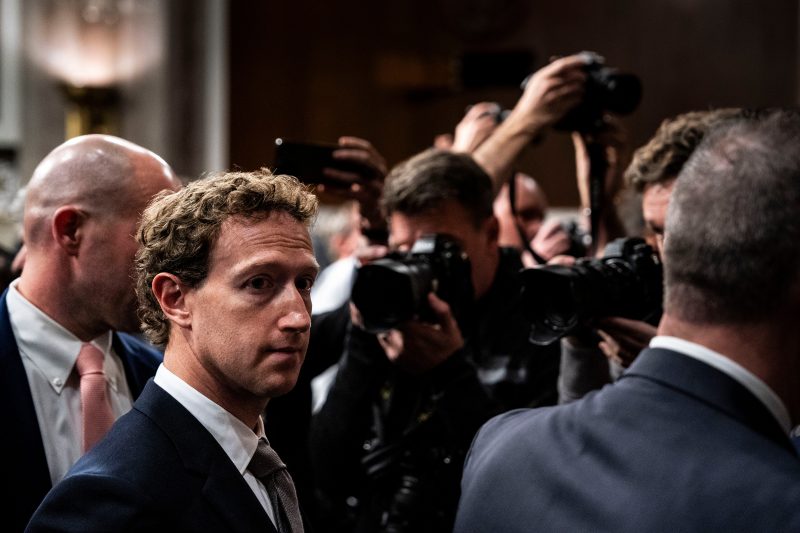
How a Zuckerberg letter got Trump to accuse himself of rigging 2020
Donald Trump on Tuesday blamed his presidential administration for rigging the 2020 election against him. But understanding why he did so requires some important background about the political moment — and how we got here.
Among the ways in which the 2016 presidential election upended American politics was the effect that it had on social media companies. While social media had existed before that contest, then-Twitter and Facebook emerged as central conduits for commentary and jokes about the candidates and their campaigns. Fans of Trump, particularly from the right-most edge of his support base, used social media to mock, mislead and at times harass his opponents. As we later learned, Russian actors were simultaneously using the platforms to sow division in the United States, to limited effect.
Those social media companies faced new pressure to crack down on abuse and falsehoods. They implemented more robust protections aimed at making it easier to sideline bad information and bad actors. And, in short order, they faced a new pressure: complaints, largely from the political right, that the mechanisms meant to foster a more positive community were disproportionately — and, many claimed, intentionally — muffling conservatives.
This was a classic example of conflated causes. Conservatives often saw content removed or their accounts demoted, but because of their content, not their politics. Prominent voices on the left were given similar limits, but at a smaller scale and without an overarching narrative of social media companies being out to get the political right.
Then 2020 arrived. The existing tensions over how social media companies policed content and users were supercharged by the coronavirus pandemic (which triggered a flurry of misinformation about the virus and, later, vaccines) and the election. Trump himself saw posts flagged as misinformation — because he was promoting misinformation.
None of this is to say that the social media companies were flawless in implementing their rules. The companies have said they made mistakes in limiting content, mistakes that were often obvious in the moment. But there’s no mystery about their motivations: trying to create environments in which people weren’t actively abused or misinformed.
Unfortunately for the companies, their efforts were already framed as partisan by the time 2020 arrived, both for the reasons above and for vaguer, based-in-lefty-California reasons. As Donald Trump was casting around to assert blame for his loss, the social media companies became rich targets. They temporarily limited the sharing of a news story about a laptop owned by Joe Biden’s son Hunter! They muffled claims that the election was being stolen or had been stolen! When Sen. Josh Hawley (R-Mo.) announced that he would block electors submitted by the state of Pennsylvania during the vote counting on Jan. 6, 2021, he cited the effects of “Big Tech” in the vote results.
Since Trump left office, the right’s attacks on social media companies have metastasized. They’ve been criticized (occasionally fairly) for their heavy hand in dealing with misinformation about the pandemic. That the companies had interactions with government officials centered on preventing election and vaccine misinformation has been presented as government efforts at “censorship.” Meta CEO Mark Zuckerberg’s efforts through his private foundation to improve election systems during the pandemic-affected 2020 election were isolated for their own misleading condemnation.
The actions of technology companies became a centerpiece of right-wing criticism, without a countervailing defense in the public conversation from the left. It is probably not surprising, then, that on Monday Zuckerberg responded to a request from the hard-right-Republican-led House Judiciary Committee with a letter broadly ceding the debate.
In his letter, Zuckerberg addressed three issues: Facebook’s approach to covid misinformation, the decision to limit sharing of the story about Hunter Biden’s laptop and the foundation’s contributions to the Center for Tech and Civic Life (CTCL) aimed at backstopping resources for elections administrators.
On the first point, Zuckerberg criticized the Biden administration for its efforts to get Facebook to address coronavirus misinformation — a political win for his Republican critics.
“Ultimately, it was our decision whether or not to take content down, and we own our decisions, including COVID-19-related changes we made to our enforcement in the wake of this pressure,” he wrote. “I believe the government pressure was wrong, and I regret that we were not more outspoken about it.”
The line between what Zuckerberg describes as “pressure” and that the decisions were ultimately Meta’s will be blurred. What’s more, the Supreme Court recently rejected the idea that the administration had crossed an unacceptable line. But this is almost exactly what Republicans wanted him to say.
The second point, about Hunter Biden’s laptop, is not new. It’s been understood for years that the FBI, hoping to avoid a 2016-like scenario in which foreign actors flood the election with stolen or invented information, was advising private companies on what to watch out for. Zuckerberg himself has previously stated that warnings from the government led to Facebook’s decision to briefly limit the New York Post story, something he indicated he regretted.
But through some combination of amnesia and opportunism, this part of his letter became a point of celebration on the right. (Similar outbursts have occurred before.) The Post put the story on its cover. And then Trump offered that post on Truth Social, the social media company he helped found after he was banned from Facebook and Twitter following the Capitol riot.
“Zuckerberg admits that the White House pushed to SUPPRESS HUNTER BIDEN LAPTOP STORY (& much more!),” he wrote, apparently paraphrasing Rep. Laurel Lee (R-Fla.), after she appeared on Fox News. “IN OTHER WORDS, THE 2020 PRESIDENTIAL ELECTION WAS RIGGED.”
Again, when the laptop story broke in October 2020, the president was Donald Trump. Also again, the response to that story was not demonstrably a factor in the election outcome.
The last point in Zuckerberg’s letter dealt with the contribution to CTCL, a contribution that included funding that aided elections administration across the country. That included underfunded blue cities and counties, becoming the basis of claims that Zuckerberg was trying to help Democrats win.
“I know that some people believe this work benefited one party over the other,” Zuckerberg wrote, even as he noted that this wasn’t the case. “My goal is to be neutral and not play a role one way or another — or to even appear to be playing a role. So I don’t plan on making a similar contribution this cycle.”
And with that the right’s victory was complete. An admission that the Biden administration had been overzealous — even as he said Facebook made the call. Identifying the FBI as the trigger for the laptop-story response — which he’d said before. And stepping away from bolstering election administration — even while saying that he was only doing so because of misinformed or bad-faith criticism.
It’s ironic: To alleviate pressure he’s felt from government actors, Zuckerberg once again sought to give them what they want.
